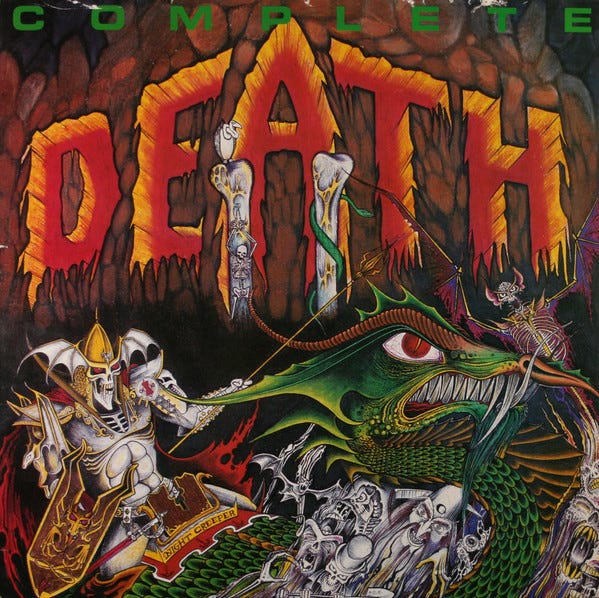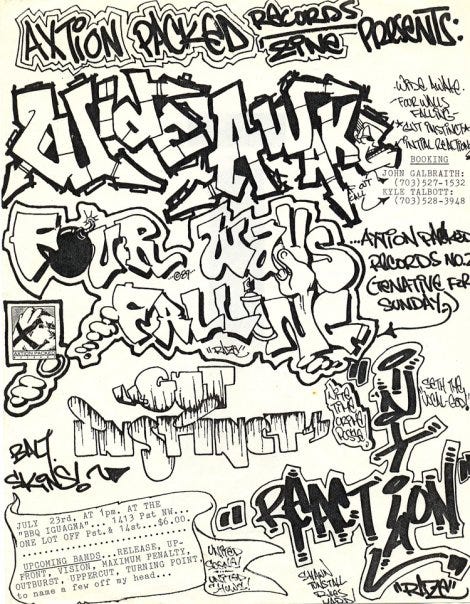INTERVIEW: TAYLOR STEELE PART II
No Idols: Tell me more about Pledge Allegiance
Taylor Steele: We were around for about two years and played a bunch of shows in Virginia Beach, Raleigh, Charlottesville and a festival in White Stone called “Rock Against Nowhere”. We did a demo and a couple of the songs from it ended up on this tape compilation called Head On Straight. The guys in C.O.C were good friends and suggested we try to get on the next Death Records compilation, Complete Death II. So, we sent Death our demo and they asked us to be on the compilation, but we broke up pretty soon after with our last show being with Dag Nasty.
How does the breakup of Pledge Allegiance morph into the formation of Four Walls Falling?
Pledge Allegiance broke up in 1986 and Four Walls Falling started at the beginning of 1987. The original lineup had Greta Brinkman and Dewey Rowell from the band Unseen Force, who had broken up at the same time as Pledge Allegiance. So I and my brother Bo and Greta and Dewey decided to do a band together.
It makes sense to me that Death Records would be interested in Pledge Allegiance since there were elements of thrash in your sound. Was the crossover stuff seeping into Hardcore an influence on the band?
With a lot of bands, all the members come from the same subgenre of Hardcore, but with Pledge Allegiance, we always had four or five members that were coming from four or five different places. Once our bass player Marc and guitar player George left Pledge Allegiance after a year, we got these three guys we knew from high school who was really into Metal. Marc and George were really good musicians, and these guys were really good as well, so we asked them to join the band. They were really into Exodus, Slayer, and Metallica, so that’s how that sound came along. But when Four Walls Falling started, there wasn’t a metalhead among us and that’s why it had a more Hardcore sound than Pledge Allegiance.
What were the circumstances of Four Walls Falling being on the Complete Death II compilation? Was it simply a matter of “Pledge Allegiance broke up, but maybe you’ll be interested in this new band we have?”?
That’s exactly what happened! We sent the track thinking they wouldn’t like it, but they liked it and put it on the compilation!
Was there interest from Death Records to release something by Four Walls Falling?
There could have been but I honestly don’t remember anything but sending that song in. I don’t think we really cared because Dewey and Greta had contacts with everyone in the scene and we figured we’d find someone when we decided to put something out.
I remember the Four Walls Falling song being on the Complete Death II compilation so, in my mind, I just figured the band to be in a crossover style. But then in the summer of ‘88, I got a ‘zine from Seattle called Open Your Eyes that was very much a part of the Straight Edge scene popping up around the country. There was an interview in the ‘zine with Four Walls Falling that was adorned with all these drawings of guys moshing in hooded sweatshirts and I found that intriguing. Was there a push to go more in the Straight Edge direction when Greta and Dewey left the band?
When we started Four Walls Falling, I was the only Straight Edge person in the band. Since I wrote the lyrics and sang them, it came off that we were a Straight Edge band, but it was an open-ended thing. I stopped drinking in ‘82, but when I was growing up in Richmond, there were no Straight Edge people, so I hung out with people who drank and did drugs. I was into stuff coming out on Corpus Christi, Dischord, X-Claim, and SST. I was into it all. Straight Edge was just another element to it all for me. But when Dewey and Greta left, we got some kids to join who were into Straight Edge. So when that interview came out, we probably had three Straight Edge people in the band or something. On a personal level, I was over with writing about Straight Edge by ‘89 and I wanted to write about politics. That’s what I was interested in. But since I was in Four Walls Falling the whole time, it was always thought of as a Straight Edge band.
It wasn’t until I went back and relistened to Four Walls Falling that I realized how radical of a band you were. An anti-capitalist Straight Edge band..what a concept!
It’s weird, right? We had the Straight Edge thing follow us throughout our career and it really confused people. We would tour Europe and Straight Edge kids would show up and be bummed we didn’t dress like a Straight Edge band. But then crust punks would show up knowing nothing about us and think we were awesome and follow us for five more shows. It seemed there were always people walking away from a show thinking we were the complete opposite of what they expected.
Your debut seven-inch came out on Axtion Packed, a label with an X’ed fist as its logo. So, you were going to be thrown into that subgenre whether you liked it or not.
I had already gone through that initial excitement of Straight Edge when I got into it in the early ’80s and that's the exact same place these kids were in the late ’80s. But I had been Straight Edge for six years already. I thought the rebirth of Straight Edge was cool, but I just wanted to write about other things.
Were you into what was going on at the time with Youth of Today, Insted, and the other bands that came in their wake?
I was. The first time I saw Youth of Today was in 1986. Again, my family was on vacation, and Bo and I found out they were playing about thirty minutes away in Virginia Beach. We heard them on that Connecticut Fun compilation and we decided to go see them. They had Craig Setari on bass and Tommy Carroll on drums and there was just total energy coming off them and people were going nuts. I saw them a couple of times back then.
We played with Insted on their first US tour in Norfolk. A bunch of nazis showed so we began to taunt them when we got on stage. Our roadie was an offensive lineman for West Virginia University and knocked them all on their asses. Insted came from L.A. where nazis were organized and a real problem. They thought we were crazy for messing with them. We had to tell them it was no big deal and it happened all the time.





